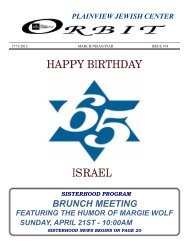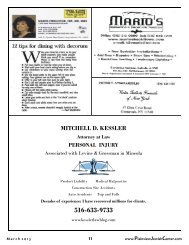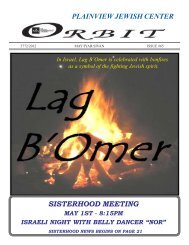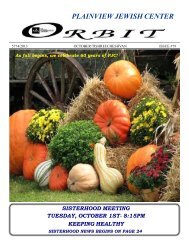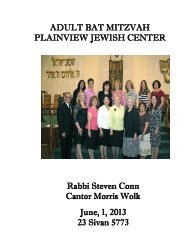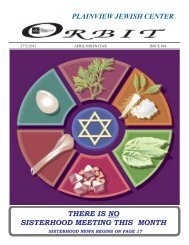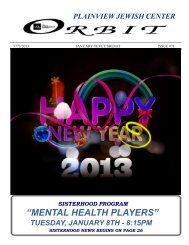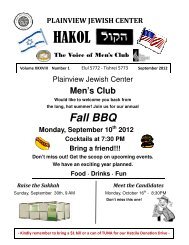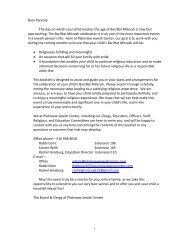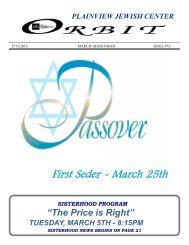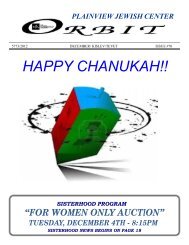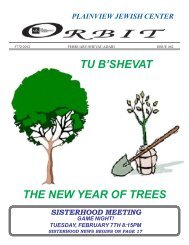sisterhood news - Plainview Jewish Center
sisterhood news - Plainview Jewish Center
sisterhood news - Plainview Jewish Center
You also want an ePaper? Increase the reach of your titles
YUMPU automatically turns print PDFs into web optimized ePapers that Google loves.
ORBIT<br />
Page 4<br />
FROM THE RABBI by Rabbi Steven Conn<br />
November 28 th is still weeks away, but the excitement over Thanksgivukah<br />
has already reached a fever pitch. News outlets in the United States and Israel<br />
have run numerous feature stories. Steven Colbert devoted several minutes on<br />
his Comedy Central Show to a tongue in cheek rant against Thanksgivukah. And<br />
the Boston publicist who came up with the idea has already trademarked the name. Thanksgivukah<br />
is everywhere: on tee-shirts and greeting cards, cooking shows and food festivals, and on the official<br />
Boston city calendar. You can even buy a menurkey—a turkey shaped Chanukiah. Only in America!<br />
Thanskgivukah, of course, refers to the rare coincidence in the United States this year of the<br />
first day of Chanukah and Thanksgiving. The two holidays have overlapped only once before, in<br />
1880. And due to the quirks of the <strong>Jewish</strong> calendar, the next Thanksgivukah won’t occur for 79,000<br />
years— unless rabbis agree to adjust the <strong>Jewish</strong> calendar to bring it back in line with the seasons<br />
before then. Thanksgivukah, then, presents us with a once in a lifetime opportunity to celebrate these<br />
two holidays together. Thanksgivukah also presents marketers with a once in a lifetime opportunity to<br />
sell a whole new line of merchandise to all of us who are caught up in the excitement.<br />
Frankly, I am not running out to buy a menurkey for this year’s celebration. And I will try to resist<br />
the temptation to send out greeting cards that say “Thanksgivukah 2013: Nun, Gobble, Hay, Shin.”<br />
Still, I am grateful that we are talking about “Thanksgivukah” this year and not “Christmakah.” For lots<br />
of reasons, Christmas and Chanukah just don’t go together; no matter how much some people try to<br />
force the issue. Christmas is a major Christian festival. Chanukah is a relatively minor <strong>Jewish</strong> holiday.<br />
Christmas celebrates the miraculous birth of Jesus, whose followers created a religion that sought to<br />
supersede Judaism. Chanukah, on the other hand, celebrates the survival of Judaism in the face of<br />
threats from inside and out. The theme of Christmas is “peace on earth, good will toward men.” The<br />
theme of Chanukah is the military victory of the few and faithful Jews over the numerous and powerful<br />
Syrian Greeks. Christmas and Chanukah, then, are entirely different holidays whose core messages<br />
conflict at many points. Putting Christmas and Chanukah together might be useful on a practical level<br />
for some people, but the result is a kind of Franken-holiday that lacks cohesion and trivializes two<br />
great religions.<br />
Thanksgiving and Chanukah, on the other hand, complement each other quite well. And why<br />
not? They both have the same origin. The Pilgrims modeled the first Thanksgiving on the Bibilical<br />
harvest holiday of Sukkot. The Maccabees also used Sukkot as the model for the celebration of<br />
Chanukah. Most of us know the Talmudic story of the menorah in the Temple that burned for eight<br />
days. But this story first appears in <strong>Jewish</strong> literature hundreds of years after the first Chanukah<br />
celebration. Long before that, historians explained that the Maccabees chose to celebrate Chanukah<br />
for eight days because the last holiday that should have been celebrated in the Temple was Sukkot.<br />
Because the Temple was defiled, however, Sukkot was not observed. Chanukah was created, in<br />
( continued on page 5 )



